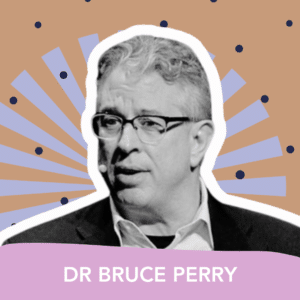Day Nineteen
Day 19: Dr Elise Bialylew interviews Bruce Perry
In this video, you’ll learn:
- What do we mean by trauma and what effect can it have on the body and mind
- Cutting edge research which reveals the impact of trauma in childhood
- How relationships are a key ingredient to healing from trauma
- What does emotional regulation mean and how can you support your nervous system to be more regulated
- A powerful way to manage tense, conflictual conversations with greater ease
- How to know how much stress is too much for children - when does stress lead to resilience versus overwhelm
Prefer to listen, rather than watch? Click the play button below.
[accessally_missing_any_tag tag_id='895' comment='MLP22']Want to read the transcript from this interview? Mind Life Project members receive access to interview transcripts and 6 months of mindfulness support, live meditations, and more👇[/accessally_missing_any_tag][accessally_has_any_tag tag_id='895' comment='MLP22']Mind Life Project Bonus Content:
Click here to download the transcript of Dr Elise Bialylew's interview with Bruce Perry.[/accessally_has_any_tag]
Your Meditation for today
MEDITATION ON Feeling Safer By Rick Hanson
A mindful minute meditation with Elise Bialylew
Bonus: This meditation is available for you to download and keep.
THE 3'Rs practice for effective conversations
In our interview today Bruce Perry describes the 3R practice.
It's a very powerful exercise that we can bring to our relationships and communication, particularly stressful interactions. I’ve been using his approach and have found it to be an incredibly powerful way to manage myself and others in reactive conversations…
As Bruce says the aim of communication is to get a message from my cortex to your cortex, (my smarter reasoning brain to your smarter reasoning brain ) but it has to get through both of our primitive brains first….
So if we are relating to someone who is in a stressed state (or if we’re overstressed) in order to actually reach the other person we need to be mindful of both ensuring we are calm and what’s called “regulated” and help the other person “regulate” or get back to a more balanced calm state…
Here are the three steps for the 3R practice:
- Regulate
- Relate
- Reason
Step 1 = Regulate (brainstem) - calm the stress response
So we need to tune in and calm ourselves before communicating, we can do this by simply pausing, taking a few deep breaths… or simply by even naming how we feel silently to ourselves or to the other person
In the first step of REGULATE we are calming the brains alarm system… making sure we’re all feeling physically and emotionally safe.
Step #2 = Relate (limbic)
When the person calms, we move to connection. We help someone feel seen, heard and understood… We do this by empathising and validating their feelings, mirroring them (reflecting back what they’ve said to us).
Step #3 = Reason (cortex/cortical brain)
It’s only once the person is calm and feels connected that our higher brain function can come back online and we have the capacity to think, reason and communicate effectively.
The next time you're faced with a difficult conversation, try out the 3R practice.
Let us know how you find it in the Facebook group.
stay on track
[progressally_objectives]
[progressally_progress_pie_chart size="80"]

 Over the last thirty years, Dr. Perry has been an active teacher, clinician and researcher in children’s mental health and the neurosciences holding a variety of academic positions. His work on the impact of abuse, neglect and trauma on the developing brain has impacted clinical practice, programs and policy across the world. Dr. Perry is the author, with Maia Szalavitz, of The Boy Who Was Raised As A Dog, a bestselling book based on his work with maltreated children and Born For Love: Why Empathy is Essential and Endangered. Dr. Perry's most recent book, What Happened to You? Conversations on Trauma, Resilience, and Healing, co-authored with Oprah Winfrey, is a #1 New York Times Bestseller. He is the Principal of the Neurosequential Network, Senior Fellow of The ChildTrauma Academy and a Professor in the Departments of Psychiatry and Behavioral Sciences at the Feinberg School of Medicine at Northwestern University in Chicago and the School of Allied Health, College of Science, Health and Engineering, La Trobe University, Melbourne, Victoria Australia.
Over the last thirty years, Dr. Perry has been an active teacher, clinician and researcher in children’s mental health and the neurosciences holding a variety of academic positions. His work on the impact of abuse, neglect and trauma on the developing brain has impacted clinical practice, programs and policy across the world. Dr. Perry is the author, with Maia Szalavitz, of The Boy Who Was Raised As A Dog, a bestselling book based on his work with maltreated children and Born For Love: Why Empathy is Essential and Endangered. Dr. Perry's most recent book, What Happened to You? Conversations on Trauma, Resilience, and Healing, co-authored with Oprah Winfrey, is a #1 New York Times Bestseller. He is the Principal of the Neurosequential Network, Senior Fellow of The ChildTrauma Academy and a Professor in the Departments of Psychiatry and Behavioral Sciences at the Feinberg School of Medicine at Northwestern University in Chicago and the School of Allied Health, College of Science, Health and Engineering, La Trobe University, Melbourne, Victoria Australia.




